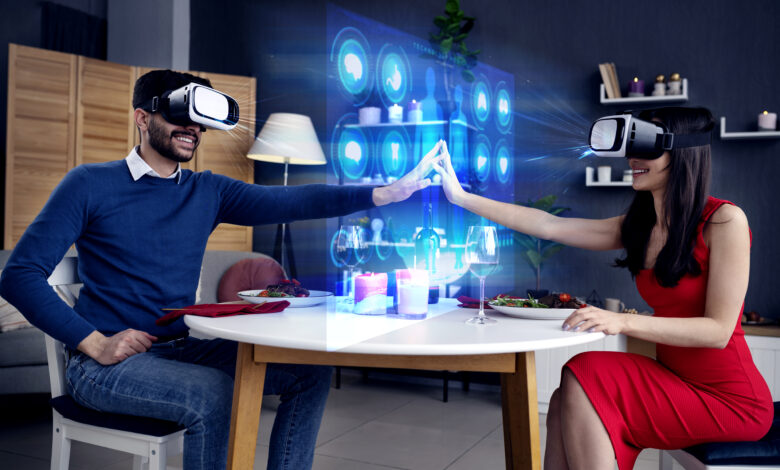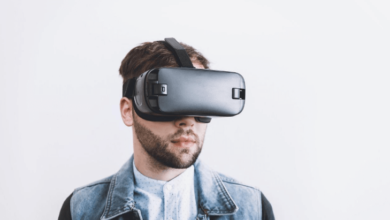Leveraging Augmented Reality (AR) for Enhanced Customer Engagement

The use of technology in marketing and digital marketing has created opportunities for previously unheard-of levels of consumer interaction. The way marketers engage with their audiences is being revolutionized by Augmented Reality (AR), which has become a crucial tool.
AR has changed the game in several ways, from immersive experiences to improved brand memory, where there is a strong need for creative approaches.
Let’s look at how AR is impacting customer interaction and engagement facets.
But first, what is Augmented Reality?
AR is an emerging technology that superimposes digital content like images, sounds, or text in tangible environments. This enriches the user’s perception by seamlessly integrating virtual elements with the physical world, commonly encountered through devices like smartphones, smart glasses, or AR headsets. AR elevates the user’s environment by delivering supplementary context, information, or interactive elements in the present moment.
Importance of Digital Marketing Certification
Amidst the surge in AR adoption, understanding its application within a digital marketing framework becomes imperative. This is where digital marketing certification, especially those focusing on AR integration, play a pivotal role. The educational landscape is witnessing a rise in specialized courses and certifications tailored to equip marketers with AR-driven strategies.
Certifications in digital marketing offer a structured learning path, empowering professionals with in-depth knowledge and practical skills. The demand for certified brand strategists who can leverage AR for enhanced customer engagement is rising. Employers seek individuals equipped with specialized expertise to navigate the evolving marketing landscape.
Many institutes offering digital marketing certification can integrate AR modules into their curriculum, ensuring students receive cutting-edge training. Collaborations with AR development firms or tech companies specializing in AR solutions can facilitate implementation.
Collaborations between certification providers, technology firms, and brands can drive innovation in AR-enabled brand strategies. By working together, these entities can develop tailored AR solutions specific to digital marketing learning while addressing market needs. Professionals with digital marketing certifications specializing in AR are likely to spearhead innovative campaigns and set new benchmarks in customer engagement.
The Impact of AR on Brand Engagement
AR blends digital elements into the real world, seamlessly combining virtual and physical experiences. Its potential in brand engagement lies in creating captivating interactions that resonate deeply with consumers. AR presents an opportunity to bridge the gap of diverse demographics and preferences and connect with audiences personally.
The Impact of AR on Customer Experience
AR enhances the customer experience by providing an interactive platform for users to engage with brands. From trying on virtual clothing to visualizing furniture in their homes before purchase, AR facilitates a more informed and engaging buying process. With the rapid growth of e-commerce, AR can be a transformative tool for businesses to stand out and create lasting impressions.
The Impact of AR on Customer Engagement
AR acts as a link between the digital and real worlds in the context of consumer engagement, enabling marketers to provide distinctive, customized experiences that enthrall their audience.
Let’s understand this better.
- Enhancing Product Interaction and Visualization
Leveraging AR in product showcasing and visualization can significantly elevate customer engagement. By creating AR-powered apps or features, customers can virtually experience products, try them out, and visualize how they fit into their lives. For instance, a furniture company can offer an AR app enabling customers to see how a couch would look in their living room, fostering a deeper connection and driving purchase intent.
- Interactive Marketing Campaigns
AR opens doors to innovative marketing campaigns that encourage active participation. Brands can create interactive AR experiences like scavenger hunts, immersive storytelling, or gamified promotions. These experiences entertain and create a lasting impression, boosting brand recall and loyalty among Indian consumers.
- Personalized and Tailored Experiences
AR allows for creating personalized experiences based on individual preferences and behaviors. By leveraging AR technology, brands can tailor content, offers, and recommendations to each customer, making engagement more relevant and enhancing customer satisfaction and loyalty.
- Real-Time Information and Assistance
AR provides real-time information overlays, enabling customers to access relevant details instantly. Whether it’s product information, pricing, or additional features, AR empowers customers with on-the-spot assistance, creating a seamless and efficient engagement process that contributes to overall customer satisfaction.
Future trends to leverage AR for Brand Success
The future of AR in the digital marketing landscape looks promising. With technological advancements and increased accessibility, AR is poised to become more ingrained in everyday brand interactions.
Let’s see how.
- Immersive Brand Experiences
Augmented reality is going to be essential to producing memorable and engaging brand experiences. Companies will use AR to take customers into virtual environments where they can engage with goods, services, and brand stories in more individualized and engaging ways.
- Social AR Integration
Social media platforms will see an increase in the incorporation of AR, giving marketers new opportunities to interact and interact with their audience. AR features in social apps can enable users to try products virtually, share AR-enhanced content, and participate in interactive brand campaigns.
- AR in E-Commerce
AR will revolutionize the online shopping experience by enabling virtual try-ons, product visualizations, and enhanced product information. Through the use of AR, brands can close the knowledge gap between online and offline buying, giving customers a more confident and educated shopping experience.
- Location-based AR Marketing
As AR technology advances, location-based marketing will become more prevalent. By using AR, brands may create tailored and location-specific brand interactions by using users’ physical location to deliver targeted and contextually relevant content.
- AR Wearables and Smart Glasses
By incorporating AR into wearables and smart glasses, marketers will have more hands-free ways to interact with consumers. This trend could lead to innovative marketing strategies, such as location-based promotions, personalized information delivery, and enhanced in-person brand experiences.
Conclusion
Augmented Reality is a transformative force in enhancing customer engagement for brands operating in the diverse and rapidly growing market. The synergy between AR and strategic brand certifications equips marketers with the tools to craft immersive, impactful campaigns. As AR continues to evolve, professionals armed with digital marketing certifications tailored to AR integration will be at the forefront of shaping the future of marketing.




